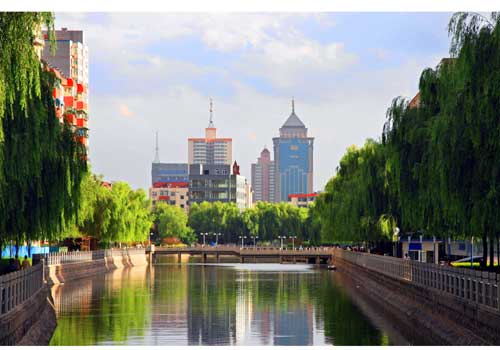The years from 2000 to 2003 were a golden period for the coking industry. Many people took advantage of this to get rich. At that time, coking plants and lime burners were everywhere in Taiyuan, shrouding the city in smog. Liang decided to close all the coking plants in urban districts. But the operation met such strong resistance that Liang even experienced death threats, because her decision had blocked some people's way to get rich quickly. In July 2003, the Bureau of Environmental Protection was ordered to pull down the chimneys of two coking plants before August. At the plant, one of the people in charge climbed to the top of a chimney and threatened to jump if plans to blow up the chimney went ahead. Some bosses of one plant organized hundreds of villagers in violent resistance, resulting in injuries to law enforcement officials from the bureau. Finally, after patient explanation and negotiation, the chimneys were successfully demolished.
"They were opposed to this not because they didn't understand the idea of environmental protection, but because it affected them personally," Liang notes. "It is a difficult decision to close such a plant, which not only affects the profits of the owners, but also leads to losses of local jobs and taxation." Liang is only too well aware of the difficulties.
She is gratified that things have changed in the past two years as environmental protection becomes more and more popular. In recent years, a green rating mechanism has been introduced to assess the achievements of officials. In the new system, GDP is no longer the only standard to judge officials' performance. In 2006, 145 off-standard applications were denied and 49 plants were closed. In 2007, 58 off-standard applications were denied or ordered to relocate. In the first half of 2008, 7 off-standard applications were denied, and 19 coking plants and 133 out-of-date factories were closed.
Taiyuan's environment has seen a great improvement due to this unremitting effort. People here say that they can once more see blue skies and breathe fresh air. The city is much cleaner and people can go out wearing light-colored clothes.
|

|
|
A clean and beautiful housing development in Taiyuan.
|
In 2000, there were only 45 days on which the air quality index reached grade 2 or above. In 2008, this number was 302. Taiyuan is a clean and beautiful city now. In 2005, Liang won the "Green China Award".
"Only by working harder can I repay Taiyuan, my beloved city. I will continue to shoulder the heaviest of responsibilities," says Liang.
(China.org.cn by Xiang Bin, February 6, 2009)